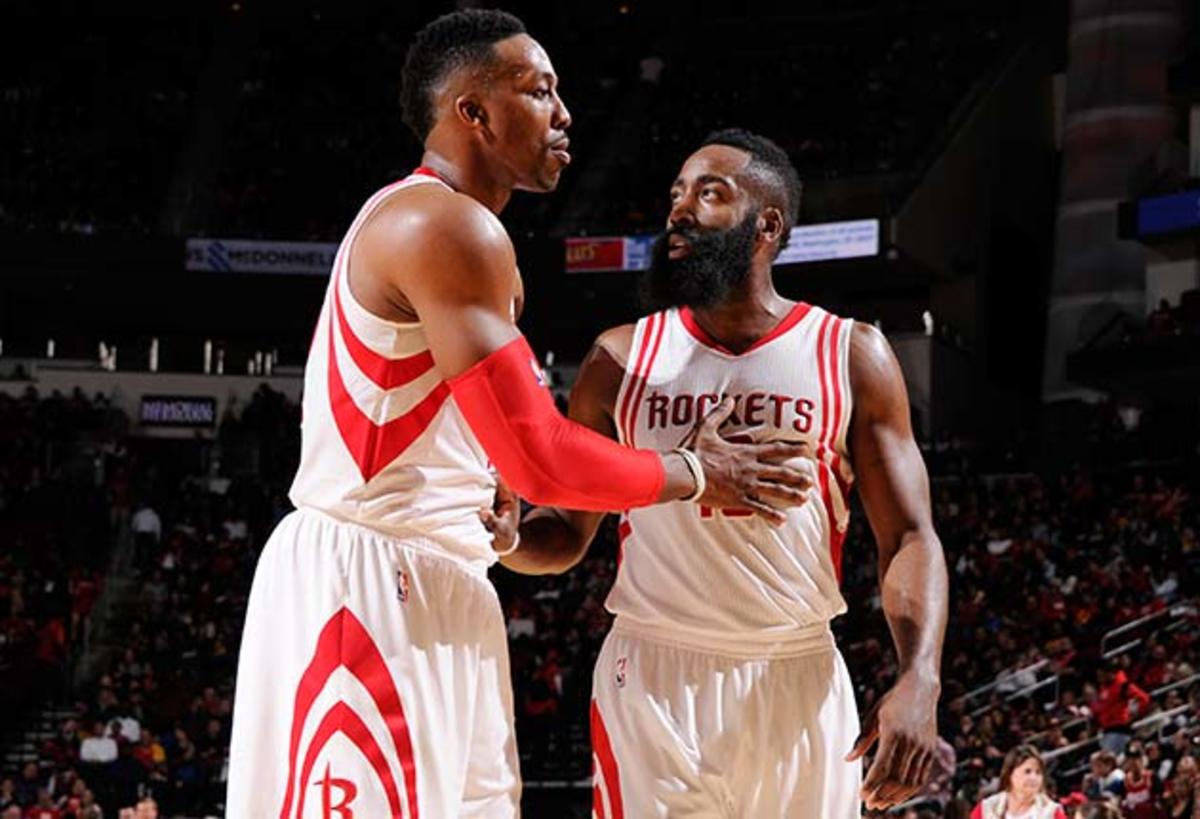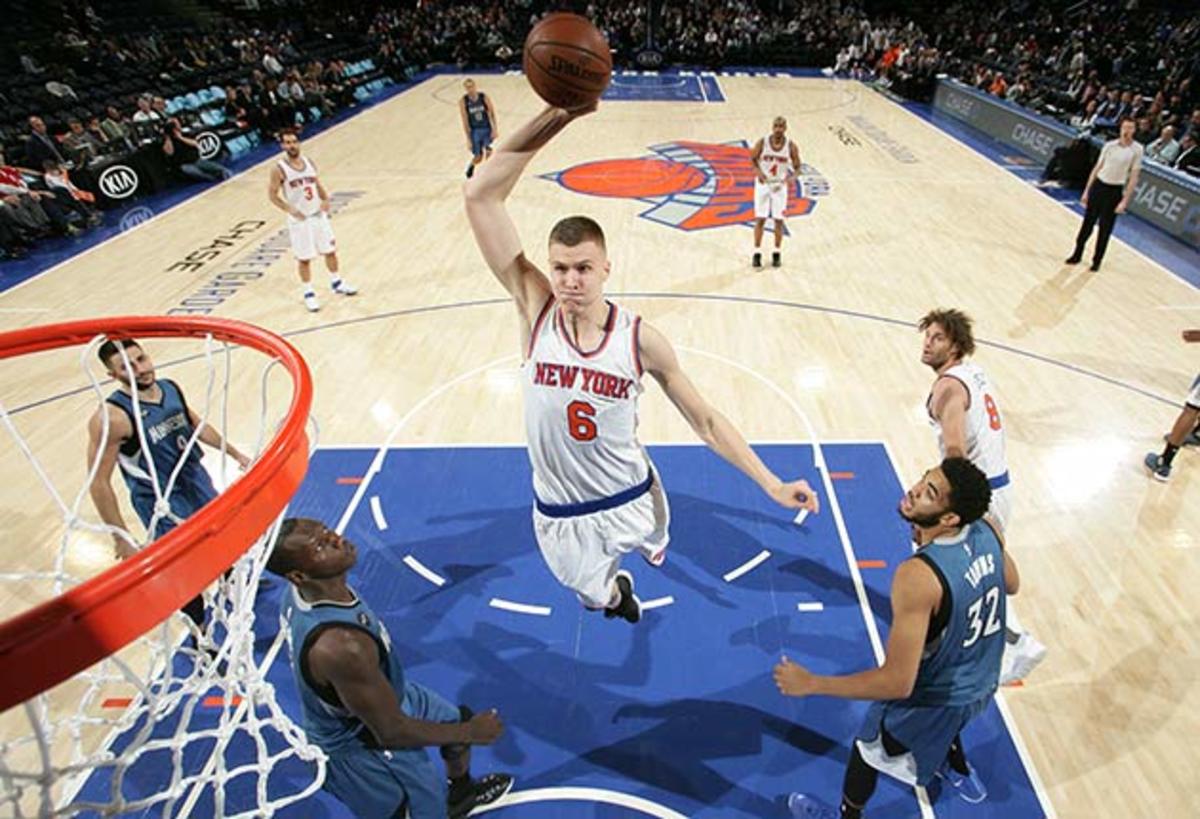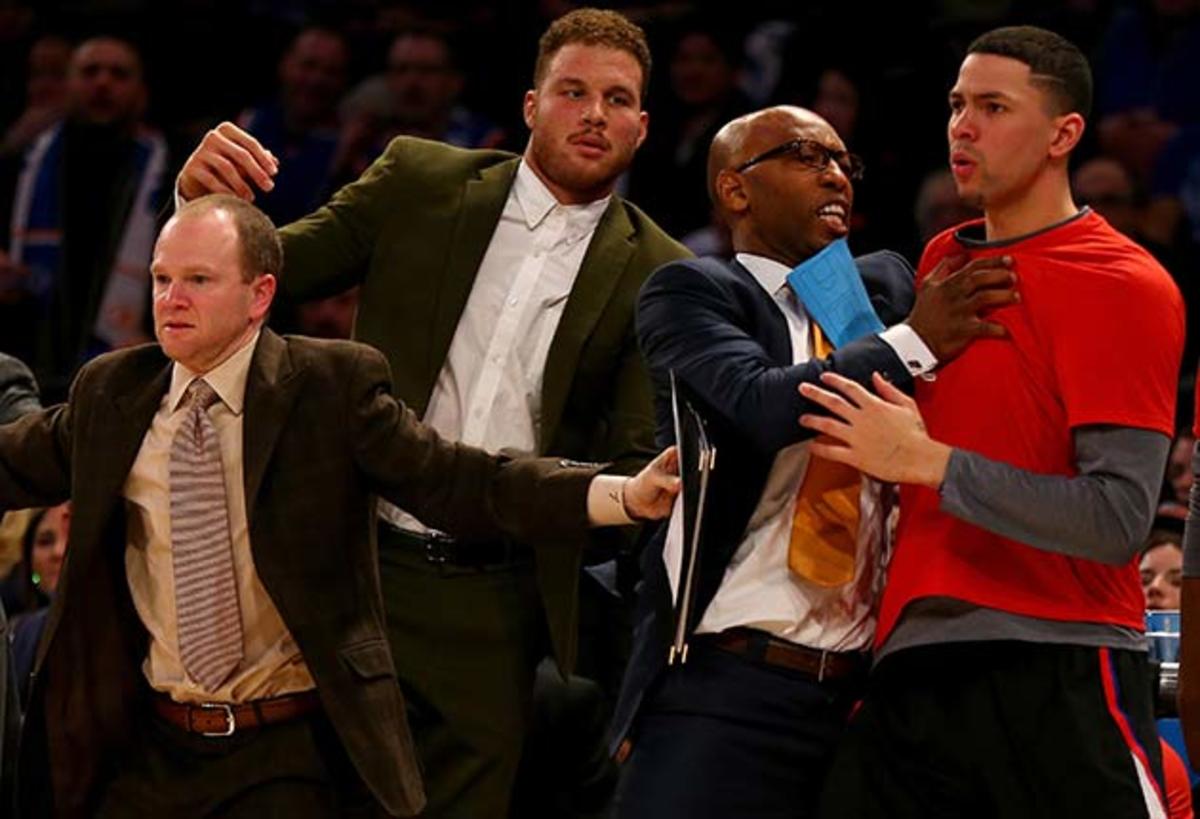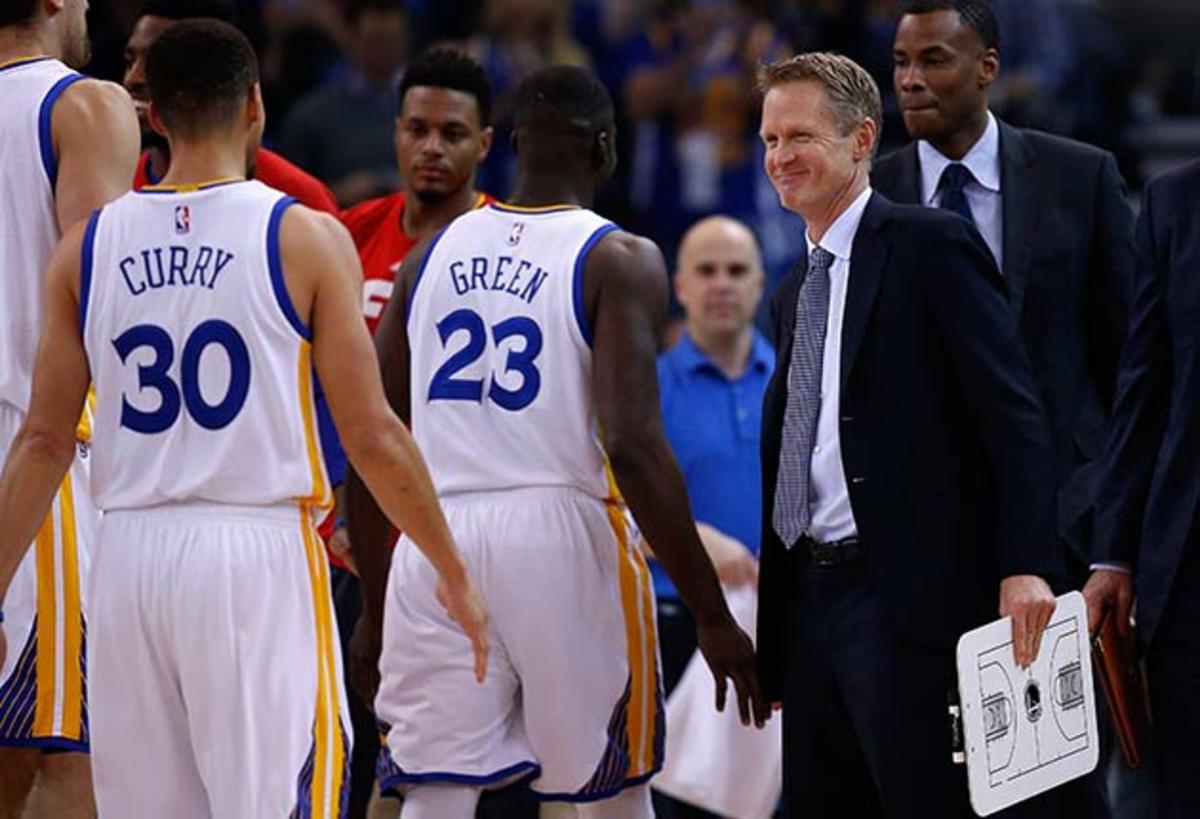NBA first half: 12 things we've learned

As of this weekend, we are halfway to June, and smack dab in the middle of the NBA season. In addition to All-Star Weekend and way more Kevin Hart appearances than you even thought possible, that means this is a time for reflection. What have we seen so far? Here are 12 lessons from the past four months of the NBA season.
1. Nobody knows what KD is doing this summer
Maybe Kevin Durant will go to Golden State, join forces with Steph, and together they will score 150 points per game for the next few years. He could go to New York and help accelerate the Porzingis takeover. He could hit South Beach and confirm all our deepest, darkest fears of Pat Riley. The Rockets? Morey will leave no stone unturned. The Lakers? Maybe he wants to follow in Kobe's footsteps. Or maybe it'll make more sense for him to stay in Oklahoma City on a one-year deal, and revisit this next summer when the cap jumps even higher.
SI's 50 greatest players in NBA history
And yes, as a Wizards fan who's been invested in this story for two years, I definitely still have hope. There is no stability on the roster. No defense. No rim protection. Not even a big man under 30 years old. The electric young shooting guard recently announced he will be on a minutes limit for the rest of his career. The coach has been dragging this team through the same miserable regular season for three years in a row. Also, the TV ratings have seen the steepest drop of any team in the league, and they'll probably miss the playoffs this spring, just in time to settle for a late-lottery pick in one of the worst drafts of the past decade. Who WOULDN'T want to come be a part of what's happening in Washington D.C.?
Bottom line: Beyond making Wizards jokes, nobody knows what Durant will do.
Coming into the season, it had become almost a consensus among NBA fans that Durant would come back to Oklahoma City on a one-year deal. Now here we are four months later, and every few weeks there's a new rumor that casts doubt on that assumption. While trusting rumors is never wise, these rumors wouldn't exist if Durant were definitely planning on coming back. It's clear that everyone around the league expects him to talk to teams, and if he's planning on meeting with teams, then anything is possible. It'll be a fun five months!
(For what's it worth: if I had to bet on it right this minute, I'd take the long odds and put my money on the Lakers. If you think that's crazy, believe me, I agree. But call it a gut feeling from someone who's been paying way too much attention to this for the past 24 months.)

2. Sometimes stereotypes are true
I've never seen a good team care less than the Rockets. They actually played the Warriors close on Tuesday—an indication of their talent—but that only makes it less acceptable for them to get run off the court at home by the Blazers three days earlier. That one was more indicative of this season, in general.
You know your uncle's stereotypes about the NBA? How players show up out of shape, coast through the regular season, constantly demand superstar calls, and have terrible attitudes? Those stereotypes have been off-base and ridiculous for a while now, yes.
It’s time to take the Raptors seriously
But some of that used to be true! If not in the '90s and early-2000s, then certainly in the 1970s. And that's where the 2016 Houston Rockets come in. As the rest of the league enters an unprecedented era of prosperity with more likable superstars than ever, the Rockets are like a living tribute to an era when NBA stereotypes were true. Returning the MVP runner-up in James Harden, adding Ty Lawson and a healthy Dwight Howard to the deepest bench in the NBA, I thought they'd finish with the best record in the NBA. Instead, they are 27-27 and currently looking at the No. 8 seed in the West.
"It's not really much of a challenge at all," Steve Kerr said last week, as he described coaching the Warriors. "Every once in a while we lose our focus, so every once in a while I have to yell at 'em or do something, but for the most part this is a very self-motivated group. They love to win, they love playing, they enjoy what they do. Everything seems to take care of itself at that point."
To understand what's happened to the Rockets in 2016, just go through that Kerr quote and imagine the polar opposite of every sentence.
3. The Raptors are the second–best team in the East
Coming into this season, there was something like a five–team Thunderdome for the second–best team in the East. You had the Bulls, the Heat, the Hawks, the Wizards... and then the Raptors, who probably garnered less votes than anyone, but have made the October debates look irrelevant. At 37–16, they're only two games behind the Cavs, and 5.5 games ahead of the third-place Celtics. They're also 9–1 in their last 10 games.
It's only February, but Kyle Lowry is still a nightmare. DeMar Derozan is attacking the rim constantly and looks better than ever. And last spring's collapse—along with Lowry's barely disguised disgust for Dwane Casey—has given way to a team that's got more energy than anyone in the East. I'm still not sure how this happened, but all of our "Who's the second-best team in the East?" questions from October have been answered. Now we get to wonder whether Lowry and DeRozan might actually push LeBron in May.
(The answer is probably no, but it will be fun as hell to watch Lowry try).
4. The Song of the Year comes from Latvia
The Knicks should play this before every game like the National Anthem.

5. Not all draft classes are created equal
Speaking of Porzingis, we're watching one of the best rookie classes of the past three decades. I'll write about them on Friday. But this is about next year's rookies. What happens when the stars aren't really there?
Ben Simmons refuses to take jump shots, and while that will make his development fascinating to watch for the next few years, it also means it's hard to put him in the Karl-Anthony Towns or Anthony Davis category. Brandon Ingram looks like he weighs 130 pounds. Kris Dunn looks very good, but he'll be 22 years old in June. Buddy Hield is one of the most enjoyable college players in years, but is he really a lottery pick? And these are the best players the draft has to offer. After that, you get into Skal Labissiere territory and all bets are off.
It's too early to write off the entire class, but it'll be something to watch as the trade deadline approaches. Is Boston's Nets pick even that valuable? Shouldn't teams be demanding Boston hand over the 2018 pick instead? Why should a middle-tier team keep its first–rounder? And for teams who are tanking, are we sure it's actually worth it? These are the questions you ask yourself as an NBA fan watching college hoops this year.
6. The Process will never die
To review:
• The Sixers went 1-30 to start the season.
• Jahlil Okafor began his career by getting into two fights in his first 60 days, getting stopped for speeding, and playing what had to be the worst defense in the NBA.
• There were no real point guards on the roster until late December.
• Nik Stauskas played most games like he was on the verge of a mental breakdown.
• Things got so bad that Brett Brown earned a contract extension simply for not losing his mind.
• While Okafor exemplified the intangible human cost of this strategy in Philadelphia, we also found out that Porzingis refused to meet with the Sixers before the draft, hoping that it would be enough to keep them from taking him. That's another hidden cost in all this.
And yet, even after Sixers owner Josh Harris stepped in to name Jerry Colangelo Chairman of Basketball Operations to help salvage some dignity, all my favorite Sixers friendsstill wouldn't admit that The Process had failed.
It was incredible, but it also underscores what made this plan so brilliant all along. By committing the future of the franchise to maximizing lottery odds, The Process can never really fail. If it doesn't lead to a title contender, its architects and all the Process-trusters of the world can merely say it wasn't given enough time to succeed. Until then, everything is part of The Process, and the future is definitely bright, because nobody can argue with raw probabilities. The stadium could be on fire right this second, and Sixers fans would claim it's all part of Sam Hinkie's plan. The new seating chart will be smarter than ever.
Of course, the other lesson of this Sixers seasons is that, it turns out, points guard are pretty important! Ever since Jerry Colangelo made a move to add a real, NBA-caliber guard, the team has still been routinely losing, but they're fun to watch on a nightly basis, and much harder to root against. The young players are actually developing, and the team looks like it's having fun. They almost beat the Clippers on Monday. Now, with the assets Hinkie has stockpiled and a traditional manager in place to help use them, the future feels much brighter. What I'm saying is ... WHERE IS ISH SMITH'S ROCKY STATUE?
7. Not everyone can be Brad Stevens
Both the Thunder and the Bulls wagered heavily on college coaches this year. Fred Hoiberg and the Bulls have been uneven all season, and the rotations still don't make much sense. But then, the roster in Chicago was also built for another era, so things should improve as the team evolves. The Thunder still rely on iso-heavy possessions from Durant and Westbrook to close out games, but maybe that would be the best strategy for any coach. Donovan will be judged on playoff success regardless of what happens in the regular season, so any judgment now is pointless.
The only certainty is that neither one is Brad Stevens, the mastermind who stepped out of college and instantly became the rock star of NBA Twitter.
Top 20 NBA players of last 20 years
We're in the age of constant Internet analysis, and part of that means coaches are criticized more often than ever. They are both the easiest scapegoats and the easiest personnel to change, so it makes sense that 10 fan bases in any given year are determined to get their coach fired. As a Wizards fan, I have probably sent no less than 250 emails to this effect. But look around the league at this year's newest coaches—Hoiberg, Donovan, Alvin Gentry, Scott Skiles—and it's hard to find many miraculous turnarounds.
In general, this season has been a reminder that there are only about five coaches whose expertise can be trusted beyond a shadow of a doubt (Popovich, Kerr, Carlisle, Stevens, Stan Van Gundy). As fans pay more attention to coaching, what we're realizing is that the best coaches in the league are almost as rare as superstars. You're more likely to end up with Alvin Gentry than Steve Kerr. That doesn't mean teams should stop trying to find their own Kerr, but it's something to keep in mind as fans are dreaming of future introductory press conferences. Speaking of which ...
8. Luke Walton is about to get PAID
This became clear during the Warriors' winning streak, and it only became more certain once we found out that the Knicks will be added to the sweepstakes with the Lakers. If I were Luke Walton's agent, I'd already be drafting a list of demands, just to see how far we can push the bidding. Ideas:
• Unlimited use of a yacht. (Note: Does not need to own a yacht. Everyone knows it's better to know a yacht owner than own one yourself. Nevertheless ...)
• Naming rights for said yacht.
• Right to hire the 2001 Arizona Wildcats as advisers (Loren Woods, Eugene Edgerson, Gilbert Arenas, etc.)
• Team of bodyguards.
• Flock of doves to introduce him at every press conference, like a John Woo movie.
• Helicopter to and from every game.
• Personal chef
• Everything on this DJ's tour rider, used to furnish the coach's office before every away game.
• Every paycheck is delivered in cash, in a gym bag, like Ricky Roe in Blue Chips.
• Speaking of Ricky Roe, Bill Walton needs a new tractor.
Those are just a few suggestions. He's got another few months to fine tune everything before it's time to talk to the Knicks and Lakers. It's good to be Luke Walton, and it's good to be Luke Walton's agent.

9. Don't punch an equipment manager even if he deserves it. Don't get caught at the home of a former teammate's wife. Don't date Kardashians
All lessons to live by. Add them to the book of NBA wisdom, right alongside "Always pay your debts to Charles Oakley" and "Don't play cards with Jerry Stackhouse". Also ...
10. Live your life like Boris Diaw
There is an abundance of great NBA writing in 2016, and it's part of what makes 82 games worth it. While we sit through eight months of basketball, there is great analytical writing, there's humor, there's reporting, features, profiles and a steady stream of Vines to make every night on the Internet entertaining. But with all due respect to everything that's been written about the NBA this season, this article—Life no sweat for Spurs’ Mr. Coffee, by Jeff MacDonald of the San Antonio Express-News—is the only thing that matters.
It has trials:
For nearly four years since joining the Spurs, Diaw suffered in silence as he was forced to satisfy his pregame coffee fix with plain old joe from the AT&T Center’s media lounge.
It has triumph:
Salvation arrived a few weeks ago in a cardboard box. Diaw now has a working espresso machine in his locker, complete with tiny cups and saucers, so he can sip his java with a teaspoon of class.
It has rich characters:
LaMarcus Aldridge has nicknamed Diaw “Tea Time” for the carefree way he ambles about the court.
It has the best nickname in sports:
Diaw’s installation of a locker room espresso machine has given rise to a new moniker: The Borista.
It should be impossible for a professional basketball team to look more enjoyable than the Warriors this season, but I think I'd rather play for the Spurs. Everyone on the team seems so comfortable with themselves, they all have a sense of humor, and they've perfected the balance between dominating at their workplace and enjoying life at the same time. I don't even know what's happening in this Instagram, I just know I want to play for the Spurs.
11. LeBron can't do this forever
This isn't even about what's happening on the court. The Cavs have been up and down throughout the season, but they should be fine, and LeBron James is still great. Despite the humiliating blowout they endured at home a few weeks ago, they still match up better with the Warriors than any team in the league. But they probably won't beat them, and this season is the first time in LeBron's career that I found myself wondering about how this ends. For the first time ever, the questions have gone from "How many titles will he win?" to "Will he ever win another one?"
LeBron's Time: Cavaliers star feeling the urgency to bring title to Cleveland
It's a bizarre feeling, and as someone who remembers when LeBron was getting busted for buying a Hummer in high school, I'm not sure I'm ready to address this new reality.
Watch Golden State run through the league, though, and the only rational conclusion is that it will take something supernatural to stop all this. Right now, even LeBron looks human for the first time in his life. But since it's LeBron, supernatural isn't entirely out of the question yet.

12. Nobody survives a perfect storm
I'm less interested in whether the Warriors will win 72 games (yes), sign Kevin Durant (no), or win the next three titles (maybe!), and more fascinated by how this happened. There were so many crossroads moments that broke exactly right to make this possible.
Examples in no particular order: 1) Andrew Bogut had to get hurt in Milwaukee before the Bucks were willing to trade him, thus enabling Golden State to overhaul its defense around him. 2) Steph Curry had to hurt his ankle often enough early in his career to hurt his market value, 3) allowing Golden State to pay him about what Ty Lawson makes, 4) and freeing up cap space to add Andre Iguodala—but 5) only after Dwight Howard turned them down. 6) Teams had to take Jimmer Fredette and Jan Vesely before Klay Thompson could fall to Golden State. 7) David Lee had to get hurt in the playoffs three years ago to teach everyone how deadly Harrison Barnes could be at the 4. 8) Then Lee had to get hurt again last year to give Draymond Green an opportunity to slide into the starting lineup and become the new Scottie Pippen. 9) They had to turn down Kevin Love for Thompson, and Stan Van Gundy had to turn them down before they landed Steve Kerr. 10) Then, finally, everyone had to stay healthy, and 11) Steph Curry had to turn into one of the most dominant offensive players of all time, completely out of nowhere.
• MORE NBA: Second-half forecast: Finals predictions, hot seat and more
In sports, there are prodigies so gifted that success is almost preordained (LeBron), and leaders so brilliant and disciplined that they turn success into its own science (Spurs). We obsess over both categories of genius, and we do it more than ever in the Internet Era. There are entire industries dedicated to identifying the prodigies, and teams will give away entire seasons to find the next one. Likewise, there are 1,000 years of history dedicated to understanding the methods of our most successful leaders, and in the NBA it happens constantly, with 100 different blog posts a week.
But as much as the current generation tries to identify stars and codify smart basketball, I think the lesson of the Warriors is that some of this will never totally make sense. Nobody was prepared for this season, even in October, and there's only so much the rest of the league can learn from what's happening here. How does anyone apply 10 perfect strokes of fate as a management strategy?
Or, more relevant to the NBA after the past four months: How do you stop it?
